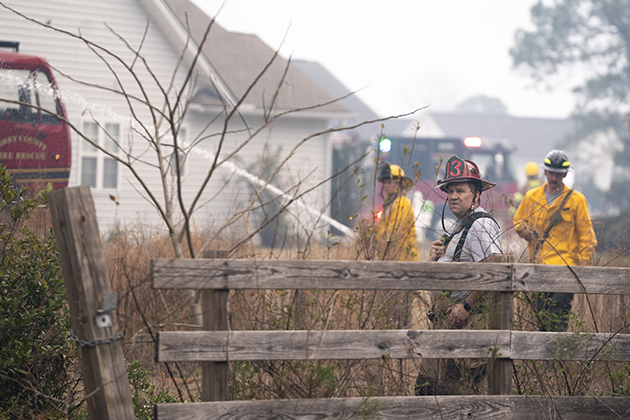Featured Topics
Featured Products
Events
S&P Global Offerings
Featured Topics
Featured Products
Events
S&P Global Offerings
Featured Topics
Featured Products
Events
S&P Global Offerings
Featured Topics
Featured Products
Events
Financial and Market intelligence
Fundamental & Alternative Datasets
Government & Defense
Professional Services
Banking & Capital Markets
Economy & Finance
Energy Transition & Sustainability
Technology & Innovation
Podcasts & Newsletters
Financial and Market intelligence
Fundamental & Alternative Datasets
Government & Defense
Professional Services
Banking & Capital Markets
Economy & Finance
Energy Transition & Sustainability
Technology & Innovation
Podcasts & Newsletters
05 Mar, 2025
By Karin Rives

| Firefighters battle a wildfire in Myrtle Beach, South Carolina, on March 2, 2025. The Trump administration has canceled financial climate-risk research and data collection as extreme weather events are driving insurance rates higher. |
Home insurance premiums rose nearly 15% faster than inflation between 2018 and 2022 in the areas of the nation most prone to climate change-fueled weather events, the US Treasury Department reported Jan. 16.
Those areas are in the top 20% of high-risk zip codes. Treasury called for closer collaboration between the insurance industry and state and federal regulators to fill coverage gaps and boost resilience in communities experiencing the highest disaster-related insurance costs and population losses.
Four days after the Treasury report, President Donald Trump rescinded a 2021 executive order that was intended to study climate-related financial risks. The Biden-era order had directed Treasury to, among other things, focus more closely on researching and collecting data to better measure how such risks affect "the competitiveness of US companies and markets."
The Jan. 16 report, along with a first-of-a-kind public-private effort to collect homeowners insurance data, was part of those efforts.
In all, Trump's orders on his first day in office reversed nearly 80 Biden-era executive decisions. In the Treasury case, the president cited "climate extremism [that] has exploded inflation and overburdened businesses with regulation."
Feds have the numbers
The US insurance industry is becoming more sophisticated and focused on climate risk analysis, and business is good for companies specializing in such risks, said Jeremy Porter, head of climate implications research for First Street. Still, the private sector cannot fill the gap when government resources go away, Porter said during an interview.
"We do a great job because we rely heavily on government-collected data in a lot of ways," Porter said. "Nobody has the manpower like the federal government does to collect the exhaustive level of data."
The Treasury Department did not respond to requests for comment on the canceled data and report.
First Street measures and predicts climate-driven risks for large financial institutions that are "trying to figure this stuff out," Porter said. Clients include government-sponsored Fannie Mae and Freddie Mac, private institutions such as Bank of America, and real estate companies and corporations trying to better understand risks to their supply chains and bottom lines.
The real estate brokerage Redfin now has a link to First Street's data at the top of its online home listings. The company ran tests a few years ago showing that homebuyers are less likely to buy a property in areas with high flood risks, according to Daryl Fairweather, Redfin's chief economist.
"We learned that people use this information in their search and when deciding where to buy," Fairweather said during an interview. "After launching flood risk we added other risk factors like heat, air quality, fire risks and ... we just prioritized getting the information out there as soon as possible."
Market perils
Climate-related disaster risks are expected to accelerate unless global greenhouse gas emissions peak and decline. Extreme weather ranked second after state-based armed conflict in the World Economic Forum's global risk report for 2025, issued in January.
In the southeastern US, March began with wildfires in North Carolina, South Carolina and Georgia, forcing evacuations and prompting South Carolina's governor to declare a state of emergency. The following day, severe thunderstorms were moving through Texas, Oklahoma and Mississippi, knocking out power for more than 400,000 customers.
Meanwhile in Southern California, still reeling from the catastrophic Los Angeles fires in January, ongoing drought has communities under continued risk for large wildfires, according to CAL FIRE.
As some insurance companies leave states they say they can no longer afford to insure — such as in California and Florida — the risk of foreclosures rise, said Mathy Stanislaus, a vice provost at Drexel University and an assistant administrator for the US Environmental Protection Agency under President Barack Obama. That shift might weaken markets and mortgage-backed securities and, in turn, destabilize the broader financial market, Stanislaus said in an interview.
"One of the things that the Treasury report calls out is the need for uniform regulatory standards to integrate risk transparency in disclosures to enable lenders and investors to better assess mortgage-related risks," Stanislaus said. "Privatizing data collection is not going to allow them to better understand those risks."
Homeowners in areas most likely to experience extreme weather events now pay 82% more for insurance than those in zip codes least vulnerable to climate risks, the Treasury report found.